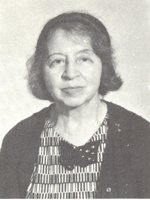Alves de Sousa, Berta - Ave Maria
 para coro feminino a quatro vozes a capella
para coro feminino a quatro vozes a capella
for 4vv female choir a cappella
year of composition / 1st publication: 1946
 |
Composer:
Berta Alves de Sousa (1916-1997)
aliases, aka: Country of origin / activity: Belgium / Portugal |
|
| Text author: traditional | ||
| Arranger / Editor: N/A |
Available documentation:
Score:| not available | |
| Publisher Casa Moreira de Sá. (1948) |
|
| My thanks and appreciation to ... for sending me this score. |
|
Lyrics: (source)
| not available |
| MIDI: not available | MP3: not available |
Recording:
| not available |
Video - posted on YouTube:
| not available at this time | YOU could be featured here! If you or your choir perform this Ave Maria, make a video recording. Post your video on YouTube, email me the page URL and I'll embed the video in this page. |
Internet references, biography information:
| http://www.mic.pt/dispatcher?where=0&what=2&show=0&compositor_id=80&pessoa_id=156&lang=EN&site=cim |
|
Born in Liège (Belgium), on the 8th of April 1906, to a family who originated from Oporto, Berta Alves de Sousa returned to this city when still very young and there she spent all her life as a teacher and composer. She graduated from the Oporto Conservatory in 1942, having studied with Bernardo Moreira de Sá, Luiz Costa, Lucien Lambert and Cláudio Carneyro. From 1927 to 1929, she studied in Paris with Wilhelm Backhaus and Theodore Szantó (piano) and George Migot (composition). In Lisbon, she improved her piano with Vianna da Motta. Having later became interested in conducting, she studied in Berlin with Clement Krauss and, in Lisbon, with Pedro de Freitas Branco. She later attended interpretation courses with Alfred Cortot (piano) and musical teaching with Edgar Willems. Berta Alves de Sousa entered the Oporto Music Conservatory in 1946 as a professor of the chamber music class. In 1949, she took over the Advanced Course of Piano in the same conservatory. At the same time, she took part in many recitals and concerts, as a soloist, as an accompanist and also as a conductress. She was member of the Board of the Institute of High Culture, has given numerous lectures and was active for many years as a music critic for the Oporto newspaper "O Primeiro de Janeiro". As a composer, her works are mainly made up of chamber music, choral religious and symphonic music, adopting an impressionist aesthetic movement and making use of polytonality on a large scale in her compositions. She also carried out experiments in Sound Symmetry, which she worked on together with its creator, the composer Fernando Corrêa de Oliveira. In 1941 she was awarded the Moreira de Sá Prize, instituted by the Orpheon Portuense. Berta Alves de Sousa died in Oporto on the 1st of August 1997. Her musical legacy is currently held by Oporto Music Conservatory. (Biography based on the Catálogo Geral da Música Portuguesa, coord. Humberto d'Ávila) |
| http://en.wikipedia.org/wiki/Berta_Alves_de_Sousa |
|
Berta Alves de Sousa (8 April 1906 – 1 August 1997) was a Portuguese pianist and composer. Biography Candida Berta Alves de Sousa was born in Liège, Belgium. She grew up in Oporto, Portugal and studied music under Moreira de Sa, Luis Costa, Lucien Lambert and Claudio Carneyro at the Music Conservatory. She continued her studies in Paris with Wilhelm Backhaus and Theodore Szanto for piano and George Mingot for composition, and in Lisbon with Vianna da Motta. She also studied orchestral conducting with Clemens Krauss in Berlin and Pedro de Freitas Branco in Lisbon.[1] After completing her studies, Alves de Sousa took a position at the Music Conservatory of Oporto in 1946 teaching chamber music, (she later became chair) and performed as a concert pianist, accompanist and conductor. She also worked as a music critic for the newspaper O Primeiro de Janeiro in Porto. In 1941 she won the Prix de Sa Moreira established by Orpheon Portuense. Alves de Sousa died in Oporto, and her papers are held by the Oporto Conservatory of Music.[2] |
Page last modified: August 17, 2013
 avemariasongs
avemariasongs org
org